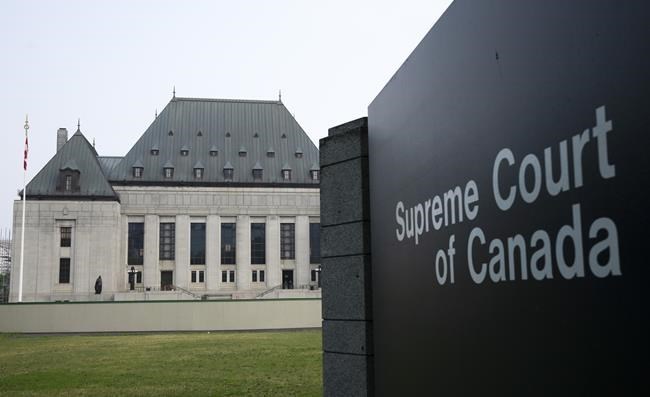OTTAWA — The Supreme Court of Canada said Thursday it will not hear the case of four Canadian men held in Syria who argue Ottawa has a legal duty to help them return home.
The mother of one of the men said after the decision that she was not about to give up, but added it was difficult to maintain hope.
The detained Canadians are among the many foreign nationals in ramshackle detention centres run by Kurdish forces that wrested the war-ravaged region from militant group Islamic State of Iraq and the Levant.
The men asked the Supreme Court to hear a challenge of a Federal Court of Appeal ruling, handed down in May, that said Ottawa is not obligated under the law to repatriate them.
Following its usual custom, the court gave no reasons Thursday for declining to hear the matter.
Among the men is Jack Letts, who became a devoted Muslim as a teenager, went on holiday to Jordan, then studied in Kuwait before winding up in Syria.
The identities of the other three are not publicly known.
In an application to the top court, lawyers for the men said Ottawa is "picking and choosing" which Canadians to help out of a hellish situation.
They said the men's foreign jailers would release them if Canada made the request and facilitated their repatriation, as it had done for some Canadian women and children.
The four men have been arbitrarily detained for several years without charge or trial, the submission to the high court noted.
"They are imprisoned in severely overcrowded and unsanitary conditions, with at least one Canadian being held with 30 other men in a cell built for six. They lack adequate food and medical attention and one of the applicants reported to Canadian government officials that he had been tortured."
The men won a battle in their protracted fight in January when Federal Court Justice Henry Brown directed Ottawa to request their repatriation from the squalid conditions as soon as reasonably possible and to supply passports or emergency travel documents.
Brown said the men were also entitled to have a representative of the federal government travel to Syria to help their release take place once the captors agreed to hand them over.
The Canadian government had argued that Brown mistakenly conflated the recognized Charter right of citizens to enter Canada with a right to return — effectively creating a new right for citizens to be brought home by the government.
The Federal Court of Appeal agreed, saying the judge's interpretation "requires the government of Canada to take positive, even risky action, including action abroad,'' to facilitate the men's right to enter Canada.
The appeal judges said while the government is not constitutionally or otherwise legally obligated to repatriate the men, their ruling "should not be taken to discourage the government of Canada from making efforts on its own to bring about that result.''
Sally Lane, Letts's mother, said in August that her son was "barely holding on."
"He and the other Canadian nationals have had to endure what no human being should ever have to endure.''
On Thursday, she expressed frustration.
"Global Affairs won't meet with me. My own MP won't listen to me. And now the Supreme Court has told me and the other families that we don't have the same rights as everyone else," Lane said in a statement released by the group Stop Canadian Involvement in Torture.
In refusing to hear this case, the court has essentially said it is acceptable for Canada to engage in the illegal practices of exile, indefinite arbitrary detention and torture, Lane added.
"We're not giving up, but today it is difficult to maintain hope when my son, the other men, and the additional women and children who remain detained have been told their lives do not matter."
The submission on behalf of the four men said the top court had an opportunity to decide whether Canada has a duty under the Charter to assist Canadians abroad when they clearly face egregious violations of fundamental human rights.
In its own filing with the Supreme Court, the Canadian government said no one disputes that the men face deplorable conditions, but the reason they cannot enter Canada is their imprisonment abroad by foreign captors.
"The Federal Court of Appeal applied settled principles of law and Charter interpretation to unchallenged findings of fact," the government said.
"Especially where there is no participation by Canada in the detention of a Canadian citizen in a foreign country, there can be no obligation under the Canadian Charter of Rights and Freedoms for Canada to secure their release and effect their repatriation."
The court decision sends a dangerous message that the Canadian government can simply abandon citizens indefinitely with no due process in prisons rife with disease and death, said Farida Deif, Canada director at Human Rights Watch.
"But the Trudeau government doesn't need a court decision to bring these Canadian men home, it simply needs to muster up the courage and political will to save their lives before it's too late," she said Thursday in a statement.
"It's high time for Canada to take the urgent steps needed to repatriate all Canadian citizens still held in northeast Syria in inhuman and degrading conditions, regardless of gender or age. Once home, adults can be monitored or prosecuted if appropriate."
This report by The Canadian Press was first published Nov. 16, 2023.
Jim Bronskill, The Canadian Press



